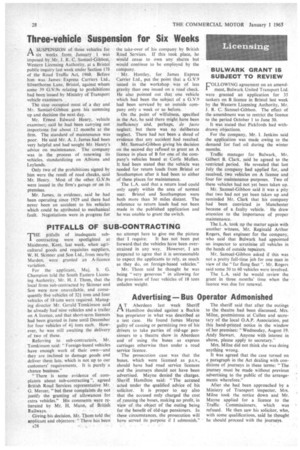Three-vehicle Suspension for Six Weeks
Page 30

If you've noticed an error in this article please click here to report it so we can fix it.
in A SUSPENSION of.. three vehicles for
six weeks from January .1 was imposed by,Mr. J. R. C. Satnuel-Gibbon; Western Licensing Authority, at a Bristol public inquiry last week under Section 178 of the Road Traffic Act, 1960. Before him was James Express Carriers Ltd., Silvcrthorne Lane, Bristol, against whom some 39 G.V.9s relating to prohibitions had been issuedby Ministry of Transport vehicle examiners.
The case occupied most of a day and Mr. Samuel-Gibbon gave his summing up and decision the next day.
Mr. Ernest.. Edward Henry, vehicle examiner, said he had been carrying out inspections for about 12 months at the firm. The standard of maintenance was poor. He said Mr. A. J.. James had been very helpful and had sought Mr. Henry's advice on maintenance. The company was in the process of renewing its vehicles, standardizing on Albions and Leylands.
Only two of the prohibitions signed by him were the result of road checks, said Mr. Henry. Most of the other G.V.9s were issued in the firm's garage or on its premises,
Mr. James, in evidence, said he had been operating since 1929 and there had never been an accident to his vehicles which could be attributed to mechanical fault. Negotiations were in progress for
the take-over of his company by British Road Services. If this took place, he WoUld cease to own any shares but would continue to be employed by the company.
Mr. Huntley, for James Express Carrier Ltd., put the point that a G.V.9 issued in the workshop was of less gravity than one issued on a road check. He also pointed out that one vehicle which had been the subject of a G.V.9 had been serviced by an outside company only a•week or so before.
On the point of wilfulness, specified in the Act, he said there might have been inefficiency and, perhaps, de facto neglect; but there was no deliberate neglect. There had not been a shred of evidence that any accident had resulted.
Mr. Samuel-Gibbon giving his decision on the second day refused to grant an A licence in place of B for one of the company's vehicles based at Corfe Mullen. It had been stated that the vehicle was needed for return loads from Bristol or Southampton after it had been to either of these places for maintenance, The L.A. said that a return load could only apply within the area of normal user. Bristol and Southampton were both more than 30 miles distant. The reference to return loads had not been made in the published application and he was unable to grant the switch.




























































































